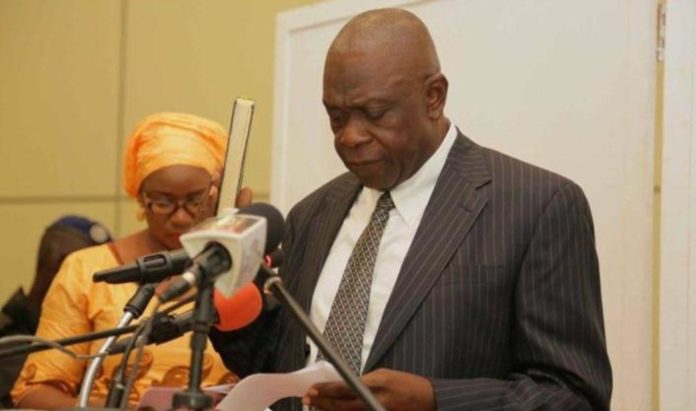Abdoulai G. Dibba
The Minister of Finance and Economic Affairs Amadou Sanneh, on Friday December 15th 2017, delivered the 2018 budget speech at the National Assembly Building in Banjul.
In his speech, Minister Sanneh told Deputies that the year 2017 has been a very challenging period for the Gambian economy as the new Government inherited a debt burden of over D56.5 billion (120 percent of GDP).
“This huge overhanging debt will put immense pressure on Government’s capacity to finance its development agenda for years to come, at a time when we face pressing development needs and strong expectations for improved livelihoods from Gambians” he said.
To mitigate this pressure, Mr. Sanneh said Government is already implementing a series of economic and institutional reforms to foster greater efficiency in the public sector, ensure macroeconomic stability and strengthen the business climate.
On the Fiscal Sector Development, Finance Minister Sanneh indicated that the preliminary estimates of government’s fiscal operations during the first nine months of 2017, indicates an improvement in the fiscal position of government, with revenue and grants expanding to D10.5 Billion, compared to D6.2 billion the same period a year ago; that this amounts to an increase of 69.4 percent.
Continuing with his budget speech, the Mr. Sanneh asserted that total revenue and grant in 2018 is estimated at D19.74 billion (37.7 percent of GDP), compared to D11.91 billion budgeted for in 2017 (25.3 percent of GDP); that this indicates a growth of 65.7 percent due mainly to an unprecedented increase in grant inflows amounting to D10.2 billon, compared to a budgeted sum of D3.2 billion in 2017
Mr. Sanneh told Deputies that tax revenue is projected to increase to D8.5 billion in 2018 compared to D8.1 billion budgeted in 2017 and that non-tax revenue is also anticipated to show great improvement with a budget of D1.0 billion (1.9 percent of GDP) in 2018, compared to a budget of D0.6 billion (1.3 percent of GDP) in 2017.
Finance Minister Sanneh further informed Deputies that total expenditure and net lending is projected at D20.6 billion (39.4 percent of GDP) in 2018 from D12.4 billion budgeted in 2017, representing an increase of 66.1 percent, the bulk of which he said, is budgeted for current expenditure.
“Overall, the fiscal deficit is anticipated to increase to D0.9 billion (1.7 percent of GDP) in 2018, from D0.5billon (1.0 percent of GDP) budgeted in 2017; this amounts to a growth of 80 percent over the period” Mr. Sanneh stated.
In 2018, Mr. Sanneh said Government would commence the implementation of a vehicle policy that would see adjustments in the following allowances:
- Transport allowance for Grade 1-8 would be increased from D500 to D1, 500 per month.
- Basic car allowance for Grades 9-10 would be increased from D1, 200 to D2, 000 per month.
- Fuel coupon allowances for Grades 11 and 12 would be monetized at D8, 500 and D10, 500 respectively.
While this is not salary restructuring, it will address some of the extremely poor remunerations of the lower cadre, he stated.
On tax reforms, Mr. Sanneh informed Deputies that Government will implement the following tax reform measures with effect from January 1st, 2018:
- Reduce import duty on rice from 15% to 0% until 2020;
- For personal income tax, the top rate will be reduced from 30% to 25% and the tax-free threshold will be increased from D18,000 per annum to D24,000 per annum.
- The corporate income tax rate on profits will be reduced from 30% to 27% and the rate on turnover will be reduced from 1.5% to 1% for audited accounts and from 2.5% to 2% for unaudited accounts.
- Residential income tax will be reduced from 10% to 8% and the tariff on commercial rent will be reduced from 15% to 10%.
- reduced the excise tariff for new cars from 25% to 20% and the tariff for used cars up to five years old will be 10% and for cars older than 5 years, a tariff of 15% will be placed on them.
- The Government during the year will study the special Investment Certificates (SIC) and duty waivers to ensure no leakages of tax.
- This new Government will undertake studies to bring the Government Pensions Scheme in line with global developments in the industry; that this will provide pensioners with decent retirement packages and give Gambian workers a better life.
- While some sectors of the economy have health insurance schemes, the majority of Gambians are without adequate health cover. The New Government will undertake studies to introduce affordable contributory health insurance schemes.
In conclusion Mr. Sanneh told Deputies that he would like to conclude by re-iterating that the country is at the cusp of falling into economic crisis; that if urgent actions to undertake transformative economic reforms are not implemented, the Gambian economy, fiscal, monetary, institutional and public financial management systems, have all crumbled to the dust with the abuse of the past 22 years of dictatorship and the mindless looting of public resources.
“We are saddled with a huge public sector debt to GDP of over 124 percent; lending rates of over 15 percent; State own Enterprises that have been pillaged to their barebones, just to name a few”, he concluded.
FOROYAA will serialise the speech in subsequent editions.



















